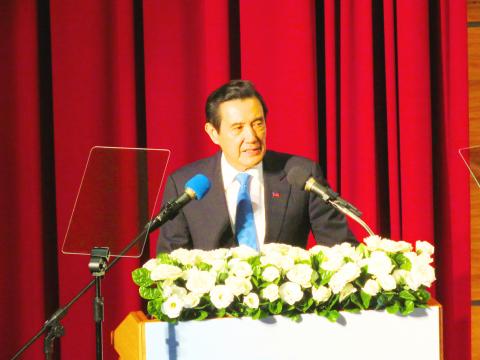The Ma Ying-jeou Foundation yesterday held a policy forum on the future of cross-strait relations to mark the third anniversary of the historic meeting between then-president Ma Ying-jeou (馬英九) and Chinese President Xi Jinping (習近平) in Singapore in 2015.
It was the first time in 66 years leaders of the two sides in the Chinese Civil War had met since the retreat of the Chinese Nationalist Party (KMT) regime to Taiwan in 1949.
At the forum, Ma said that the “1992 consensus” was an actual political accord between Taiwan and China.

Photo: CNA
President Tsai Ing-wen’s (蔡英文) administration’s refusal to recognize the consensus is tantamount to unilaterally abolishing the accord, Ma said.
The “1992 consensus,” a term former Mainland Affairs Council chairman Su Chi (蘇起) in 2006 admitted making up in 2000, refers to a tacit understanding between the KMT and the Chinese government that both sides of the Taiwan Strait acknowledge there is “one China,” with each side having its own interpretation of what “China” means.
Ma said the Tsai administration does not seem to understand that the consensus is a mark of trust, and without it cross-strait relations are deteriorating, leading to a complete standstill in quasi-governmental interactions and affecting Taiwan’s economy, politics and diplomacy.
Declining Chinese tourists numbers, the inability to sell Taiwanese produce in China and increased Chinese pressure on international organizations are all examples of how Taiwan is being affected, Ma said.
He also criticized the Tsai administration for failing to come up with an alternative to the consensus.
Ma called on Beijing not to attack the formula of “one China, with different interpretations,” saying that the existence of the ROC is the only thing preventing the realization of Taiwanese independence.
The acknowledgment that there is “one China” is crucial to preventing Taiwanese independence, Ma added.
The eventuality of unification is stated in the preface of the ROC Constitution, although it lacks a time line, Ma said.
The preface to the amendments in the Constitution states: “To address needs prior to the country’s unification, we have made the amendments to the Constitution as follows,” he said.
Any deal on unification should be conducted democratically, peacefully and take time, but such prerequisites have yet to be met, Ma said.
Taiwan should remain open to the possibility of unification, should not endorse independence and should call on China to avoid the use of force, Ma said.
The two sides must work toward a mutually agreed resolution, as reliance on any third party could bring negative effects, he said, adding that the US and Japan understand this possibility well.
Ma said that any cross-strait policy — regardless of political party — proposed during the 2020 presidential electoral campaign must stand up to public scrutiny.
Political parties owe it to the people to propose policies that discuss the direction of cross-strait relations, identify potential problems and provide viable solutions, Ma said.

Taiwan is stepping up plans to create self-sufficient supply chains for combat drones and increase foreign orders from the US to counter China’s numerical superiority, a defense official said on Saturday. Commenting on condition of anonymity, the official said the nation’s armed forces are in agreement with US Admiral Samuel Paparo’s assessment that Taiwan’s military must be prepared to turn the nation’s waters into a “hellscape” for the Chinese People’s Liberation Army (PLA). Paparo, the commander of the US Indo-Pacific Command, reiterated the concept during a Congressional hearing in Washington on Wednesday. He first coined the term in a security conference last

Prosecutors today declined to say who was questioned regarding alleged forgery on petitions to recall Democratic Progressive Party (DPP) legislators, after Chinese-language media earlier reported that members of the Chinese Nationalist Party (KMT) Youth League were brought in for questioning. The Ministry of Justice Investigation Bureau confirmed that two people had been questioned, but did not disclose any further information about the ongoing investigation. KMT Youth League members Lee Hsiao-liang (李孝亮) and Liu Szu-yin (劉思吟) — who are leading the effort to recall DPP caucus chief executive Rosalia Wu (吳思瑤) and Legislator Wu Pei-yi (吳沛憶) — both posted on Facebook saying: “I

Sung Chien-liang (宋建樑), who led efforts to recall Democratic Progressive Party (DPP) Legislator Lee Kun-cheng (李坤城), was released on bail of NT$80,000 today amid outcry over his decision to wear a Nazi armband to questioning the night before. Sung arrived at the New Taipei District Prosecutors’ Office for questioning in a recall petition forgery case last night wearing a red armband bearing a swastika, carrying a copy of Adolf Hitler’s Mein Kampf and giving a Nazi salute. Sung left the building at 1:15am without the armband and covering the book with his coat. Lee said today that this is a serious

A mountain blaze that broke out yesterday morning in Yangmingshan National Park was put out after five hours, following multi agency efforts involving dozens of fire trucks and helicopter water drops. The fire might have been sparked by an air quality sensor operated by the National Center for High-Performance Computing, one of the national-level laboratories under the National Applied Research Laboratories, Yangmingshan National Park Headquarters said. The Taipei City Fire Department said the fire, which broke out at about 11am yesterday near the mountainous Xiaoyoukeng (小油坑) Recreation Area was extinguished at 4:32pm. It had initially dispatched 72 personnel in four command vehicles, 16